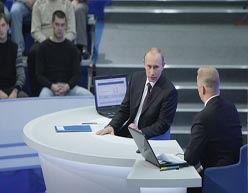Putin rounds up the year and raises key policy issues in direct link up with citizens

MOSCOW, Russia — Keeping up a tradition devised during his presidency, Vladimir Putin, the powerful Russian prime minister, used his signature direct interaction with the citizens to assess the outgoing year’s political, social and economic results on the background of the current global financial crisis, and also made some keynote remarks on vital domestic and foreign policy issues that will certainly generate mixed reactions from local and international Russia observers, both at home and abroad.
Thus, commenting on the global crisis and its drastically negative impacts on the domestic economy, Putin noted that he can say with a high degree of confidence that Russia had overcome the peak of crisis, although the turbulent phenomena, still much alive in both Russian and world economies, will require more time, efforts and massive funds from governments in order to completely exit the crisis.
On the whole, Putin seems fully satisfied with his government’s handling of the crisis, noting that the country “is coping well with the problems generated by crisis, evident in the visible growth in several key economic sectors, including the agriculture and space industries. “Some experts had expected the drop in our GDP to reach 10%, but it will be less at 8.5-8.7% by yearend,” he said. “We have restored our gold and currency reserves, currently standing at $444bln, the third in the world, after China and Japan, we have a positive trade balance and one of the best inflation indicators at 9%, a single digit.”
He later went on to speak about other issues such as economic reforms, unified customs agreement with Belarus and Kazakhstan, WTO, Yukos case, increasing criminal incidences in the Interior Ministry, rampant corruption, technogenic tragedies, including terrorism, and several other issues, including personal ones, such as when the prime minister plans to finally step aside from the government to let ‘fresh’ blood into Russian politics.
Thus, speaking on the Nevsky Express train tragedy, Putin noted that the country had already done a lot to break the back of terrorism, but the threat has not been removed completely, evident in the Nevsky Express terrorist act. “The Interior Ministry has often achieved their objectives in this respect. But this recent train tragedy calls for boosting efforts in this particular direction. “This indicates that we must act with resoluteness against people who attempt to kill people. We have the firmness to do this.”
Commenting on the high-profile Yukos Oil Co. case that led to the jailing of the company’s former owner Mikhail Khodorkovsky and other high-ranking executives, Putin noted the money gained from bankrupting the out-of-favor oil major was used to create a 240bln ruble utilities fund that has already benefited 10mln people, whose houses and flats had been repaired, with another 150,000 residents expected to relocate to new houses from slums soon. The prime minister noted that the ultimate goal was to return the money stolen from the people to the people. “If this money was once stolen from people, it must be returned to them directly, not to some abstract people, but some concrete individuals, who have found themselves in the most difficult situations.
However, feeding a question on his presidential ambitions in 2012, a popular and recurrent issue on his and President Dmitry Medvedev’s public and media appearances in and outside the country, the traditional straight talking prime minister became elusive, offering a loosely phrased answer, “I will think about it. There is still time," an ambiguous reply that only serves to collaborate the rumored existence of a certain agreement on the issue with the incumbent president. "Everyone should perform his duty, work effectively and, depending on the prevailing economic and social situation, make the appropriate decision regarding the 2012 presidential election,” he said. “The biggest mistake would be to devote the time needed to solve current problems to the interests of the future election campaigns.”
But the question of the day came from Linar, a caller from the southern Russian city of Kransdonar, who asked the prime minister when he finally would exit politics for good, and make room for him to take over the office. The caller must have got both the shock and best future job prospect in his life, as the prime minister said, ‘not in your lifetime’ to the question, but went ahead to reassure him that “if you have a desire to work together, we can discuss your proposal and offer you a good job to enable you to fully realize your potential.”












 Web design,
Web design,